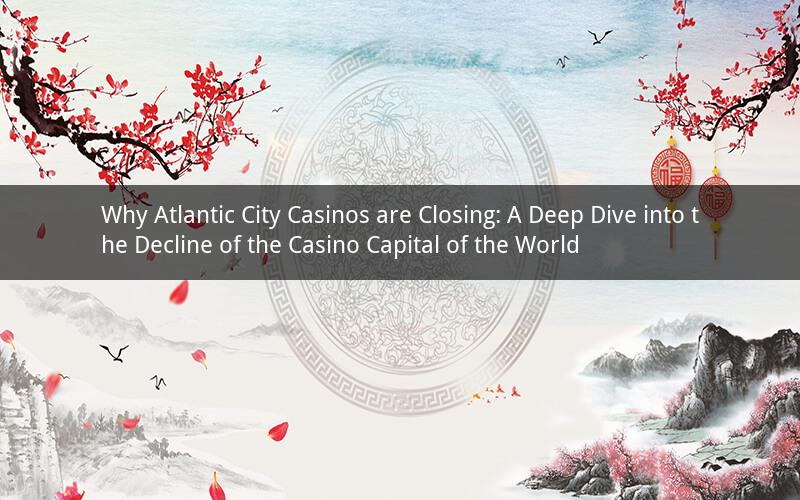
Introduction:
Once the shining beacon of gambling and entertainment, Atlantic City has witnessed a dramatic decline in the number of casinos. The once bustling streets are now filled with empty venues and a sense of desolation. This article aims to delve into the reasons behind the closing of Atlantic City casinos and shed light on the factors that contributed to this downfall.
1. Competition from Online Casinos:
In recent years, the rise of online gambling has posed a significant threat to the traditional brick-and-mortar casinos. With the convenience of playing from the comfort of one's home, more and more gamblers are turning to online platforms. This shift in consumer behavior has led to a decrease in foot traffic and revenue for Atlantic City casinos.
2. The Impact of the Great Recession:
The global financial crisis of 2008 had a profound impact on the casino industry, including Atlantic City. The recession resulted in a decrease in disposable income, leading to a reduction in gaming spending. Many casinos faced financial difficulties, forcing them to close down or restructure their operations.
3. Increased Competition from Nearby States:
Atlantic City's dominance as the casino capital of the world was challenged by the opening of casinos in neighboring states. States such as Pennsylvania, Delaware, and New York have all established their own casinos, attracting a portion of the gaming market that was once dominated by Atlantic City. This competition has significantly reduced the revenue and profitability of Atlantic City casinos.
4. High Operating Costs:
Operating a casino is an expensive endeavor, with high costs associated with maintenance, personnel, and marketing. Many Atlantic City casinos have struggled to maintain profitability in the face of declining revenue. The high operating costs, combined with the challenges posed by online gambling and increased competition, have pushed several casinos to close their doors.
5. Decline in Tourism:
Atlantic City's decline can also be attributed to a decrease in tourism. Once a popular vacation destination, the city has faced a decline in visitors due to factors such as increased crime rates, poor infrastructure, and a general perception of decline. This decrease in tourism has further impacted the revenue of the casinos.
6. Changing Demographics:
The demographics of Atlantic City's customer base have also played a role in the closing of casinos. The core demographic of gamblers has shifted from middle-aged adults to younger demographics, who are more inclined to engage in online gambling. This shift has made it difficult for Atlantic City casinos to attract and retain customers.
7. Lack of Innovation:
In order to compete with online casinos, Atlantic City casinos needed to innovate and offer unique experiences. However, many casinos failed to adapt to changing trends and continue to rely on traditional gambling and entertainment offerings. This lack of innovation has contributed to their decline.
Conclusion:
The closing of Atlantic City casinos is a complex issue that can be attributed to various factors. From increased competition to changing consumer preferences, the decline of Atlantic City's casino industry is a testament to the challenges faced by the gambling industry in the modern era. The lessons learned from Atlantic City's downfall can serve as a cautionary tale for other gambling destinations, highlighting the importance of adapting to the changing landscape of the industry.
Questions and Answers:
1. Q: How has the rise of online casinos impacted Atlantic City casinos?
A: The rise of online casinos has led to a decrease in foot traffic and revenue for Atlantic City casinos. Many gamblers now prefer the convenience of playing from home, which has had a significant impact on the traditional casinos.
2. Q: What role did the Great Recession play in the closing of Atlantic City casinos?
A: The Great Recession resulted in a decrease in disposable income, leading to a reduction in gaming spending. Many casinos faced financial difficulties and were unable to sustain their operations during this period.
3. Q: How has increased competition from neighboring states affected Atlantic City casinos?
A: The opening of casinos in neighboring states has attracted a portion of the gaming market that was once dominated by Atlantic City. This increased competition has significantly reduced the revenue and profitability of Atlantic City casinos.
4. Q: What are the challenges faced by Atlantic City casinos in terms of operating costs?
A: Operating a casino is an expensive endeavor, with high costs associated with maintenance, personnel, and marketing. Many casinos have struggled to maintain profitability in the face of declining revenue and high operating costs.
5. Q: How has the changing demographic affected Atlantic City casinos?
A: The core demographic of gamblers has shifted from middle-aged adults to younger demographics, who are more inclined to engage in online gambling. This shift has made it difficult for Atlantic City casinos to attract and retain customers.